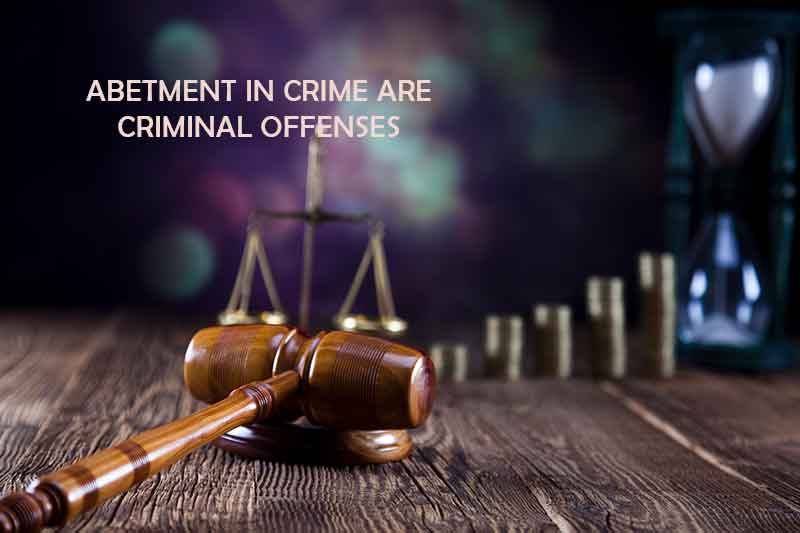The United Arab Emirates maintains a steadfast position on holding individuals accountable for criminal acts, encompassing not only the direct perpetrators but also those who aid or abet in the commission of unlawful activities. The concept of aiding and abetting entails the intentional facilitation, encouragement, or assistance in the planning or execution of a criminal offense. This legal principle ascribes culpability to individuals for their conscious involvement, even if they did not directly perpetrate the crime themselves. Within the UAE’s legal framework, aiding and abetting can result in severe penalties, often commensurate with the punishments prescribed for the principal offense.
Garnering a comprehensive understanding of the ramifications associated with this principle is of paramount importance for residents and visitors alike, as inadvertent actions or omissions can potentially implicate them in criminal proceedings, necessitating a thorough grasp of the relevant legal provisions.
What Constitutes Aiding and Abetting a Crime under UAE Law?
The United Arab Emirates’ current Penal Code, Federal Decree-Law No. 31 of 2021 [On the Issuance of the Crimes and Penalties Law], provides the legal definition of what constitutes aiding and abetting a crime. According to Articles 45 and 46 of this law, a person is considered an accomplice if they intentionally and knowingly assist or facilitate the commission of a criminal act.
Intention and knowledge of the crime are crucial factors in determining accomplice liability under UAE law. Mere presence at the scene of a crime, without active participation or intent to aid the perpetrator, does not automatically constitute aiding and abetting. The extent of an accomplice’s involvement dictates the severity of the penalty they face. Article 46 states that an accomplice may receive the same penalty as the perpetrator or a lesser punishment, depending on the specific circumstances and their level of participation in the criminal act.
Some examples of actions that could constitute aiding and abetting under UAE law include providing weapons, tools or other means to commit the crime, encouraging or instigating the perpetrator, assisting in the planning or execution stages, or helping the perpetrator evade justice after the fact.
It is important to note that the legal interpretations and applications are ultimately at the discretion of UAE judicial authorities on a case-by-case basis.
Qodobbada Abetment
Si uu falku ugu qalmo beddelka, laba walxood oo muhiim ah waa in la buuxiyaa:
- Actus Reus (Xeerka Dambiyada): Tani waxa ay tilmaamaysaa falalka gaarka ah ee kicinta, ka qayb qaadashada shirqoolka, ama gargaarka ulakac ah. Actus reus waa qaybta jidheed ee dembiga, sida falka lagu dhiirigelinayo qof inuu dhaco ama la siiyo si ay u sameeyaan.
- Mens Rea (Maskaxda Dambiga leh): Dambiiluhu waa inuu leeyahay ujeedo uu ku kiciyo, caawiyo, ama u fududeeyo samaynta fal-dembiyeedka. Mens rea waxaa loola jeedaa cunsur maskaxeed ee dembi, sida ulajeedka in lagu caawiyo qof samaynta fal dambiyeed.
Intaa waxaa dheer, guud ahaan ma jirto wax shardi ah in dembiga la soo dejiyay si guul leh loogu fuliyo mas'uuliyadda iyadoo loo eegayo sharciga ku-habboonaanta. Dhagar qabaha waxa lagu dacwayn karaa iyada oo lagu salaynayo ulajeedkooda iyo ficiladooda kor loogu qaadayo dambiga, xataa hadii dambiga laftiisa aan waligiis la dhamaystirin.
Noocyada ama qaababka Abetment
Waxaa jira saddex siyaabood oo aasaasiga ah dembiyada abetment waxay dhici kartaa:
1. Kicin
Si toos ah ama si dadban loo qeexay boorriyay, xanaaq badan, dhiirigelinta, ama baryootan qof kale inuu dembi galo. Tani waxay ku imaan kartaa erayo, dhaqdhaqaaqyo, ama siyaabo kale oo isgaarsiineed. Kicintu waxay u baahan tahay ka-qaybgal firfircoon iyo ujeeddo dembiyeed. Tusaale ahaan, haddii qof uu si isdaba joog ah ugu sheego saaxiibkiis inuu dhaco bangiga oo uu bixiyo qorshayaal faahfaahsan oo ku saabsan sida loo sameeyo, waxay noqon karaan dembiga kicinta dembiga, xitaa haddii saaxiibku uusan waligiis raacin tuugada.
2. Shirqool
An heshiiska u dhexeeya laba qof ama in ka badan si ay dambi u galaan. Inta badan la tixgeliyo qaabka ugu daran Shirqoolku wuxuu u baahan yahay oo keliya heshiiska, iyadoon loo eegin wax tallaabo ah ama tallaabo kale oo la qaaday. Shirqool wuu jiri karaa xitaa haddii ashkhaastu aanay waligood fulin dembiga la qorsheeyay.
3. Gargaar ula kac ah
Bixinta caawimada ama agabka sida hub, gaadiid, talo si ula kac ah u caawisa fal dambiyeedka. Caawinta ula kac ah waxay u baahan tahay dhib iyo qasid firfircoon. Mas'uuliyaddu waxay khusaysaa xitaa haddii uusan qofka wax iibsanaya uusan jir ahaan joogin goobta dembiga. Tusaale ahaan, haddii qof si badheedh ah u amaahiyo baabuurkiisa saaxiib si uu ugu isticmaalo tuugo qorshaysan, waxay noqon karaan dembi inay si ula kac ah u caawiyaan dembiga.
Difference between Abettor and Offender
| Abettor (Accomplice) | Offender (Perpetrator) |
|---|---|
| An abettor or accomplice is an individual who intentionally aids, facilitates, encourages, or assists in the planning or execution of a criminal act. | An offender, also known as a perpetrator, is the individual who directly commits the criminal act. |
| Abettors do not directly commit the crime themselves but knowingly contribute to its commission. | Offenders are the principal actors who carry out the unlawful act. |
| Abettors can be held liable for their role in supporting or enabling the crime, even though they did not personally carry it out. | Offenders are primarily responsible for the criminal offense and face the full extent of the prescribed punishment. |
| The level of involvement and intent determines the extent of an abettor’s culpability and punishment, which may be equal to or lesser than the offender’s. | Offenders typically receive the maximum penalty for the committed crime, as they are the direct perpetrators. |
| Examples of abetting actions include providing weapons, tools, or assistance, encouraging or instigating the crime, aiding in planning or execution, or helping the offender evade justice. | Examples of offender actions include physically committing the criminal act, such as theft, assault, or murder. |
| Abettors can be charged as accomplices or co-conspirators, depending on the specific circumstances and their level of involvement. | Offenders are charged as the principal perpetrators of the crime. |
This table highlights the key differences between an abettor (accomplice) and an offender (perpetrator) in the context of criminal acts, based on their level of involvement, intent, and culpability under the law.
Punishment for Abetting a crime in UAE
According to the UAE Penal Code (Federal Decree-Law No. 31 of 2021), the punishment for abetting a crime depends on the nature of the abettor’s involvement and the specific crime they aided or abetted. Here’s a table outlining the potential punishments based on different types of abetment:
| Primary Type | Description | Ciqaabtu |
|---|---|---|
| Instigation | Deliberately encouraging or urging another individual to engage in criminal conduct. | Equivalent to the penalty imposed on the principal offender if the instigator was aware of the intended crime (Article 44 of the UAE Penal Code). |
| Dagaal | A premeditated agreement among two or more parties to carry out an unlawful act. | Conspirators are generally subjected to the same punishment as the main perpetrator. Nonetheless, the judge retains discretionary power to reduce the sentence (Article 47 of the UAE Penal Code). |
| Intentional Aiding | Knowingly providing assistance or support to another person with the understanding that they plan to commit a crime. | The severity of the penalty varies, contingent upon the gravity of the offense and the degree of assistance rendered. Punishments can range from monetary fines to incarceration (Article 48 of the UAE Penal Code). |
What are the defenses Against Abetment Charges in UAE
Iyadoo abetment loo tixgeliyo dembi culus, dhowr difaac oo sharci ayaa jira oo qareen difaac dambiyeed khibrad leh uu shaqaaleysiin karo:
- Ujeedo ama aqoon la'aanta loo baahan yahay: Haddii awaamiirta uusan ku talo jirin inuu caawiyo ama dhiirigeliyo dembiga, ama uusan ka warqabin dabeecadda dembiga ee falalka, tani waxay keeni kartaa difaac.
- Ka-noqoshada shirqoolka dembiilaha: Haddii dawakhsigu ka baxo shirqoolka ka hor inta aan dambiga la gelin oo uu qaado tillaabooyin uu kaga hortagayo dhacdadiisa, tani waxay diidi kartaa mas'uuliyadda.
- Sheegashada qasbida ama qasbida: Haddii awaamiirta lagu qasbay in uu caawiyo ama dhiiri galiyo dambiga isagoo ku hanjabaya waxyeelo ama rabshad, tani waxay u adeegi kartaa difaac ahaan.
- Muujinta sababta fashilantay ee u dhaxaysa falalka iyo dembiyada: Haddii ficilada awaamiirta aysan si toos ah gacan uga geysan samaynta dembiga, tani waxay wiiqi kartaa kiiska xeer ilaalinta ee dejinta mas'uuliyadda.
- Mistake of fact: If the abettor had a reasonable belief that the act they aided or abetted was not illegal, based on a mistake of fact, this could provide a defense.
- Entrapment: If the abettor was induced or entrapped by law enforcement to aid or abet the crime, this could potentially serve as a defense.
- Statute of limitations: If the prosecution of the abetment charge is brought after the legally prescribed time limit or statute of limitations, this could result in dismissal of the case.
Fahamka xeeladaha suurtagalka ah iyo isticmaalka horudhacyada sharciga kiiska ayaa fure u ah dhisidda difaac wax ku ool ah oo ka dhan ah eedeymaha ku-habboonaanta.
Ugu Dambeyn
Denbiga wax-is-daba-marinta waa in aan si fudud loogu qaadan Imaaraadka. Dhiirri-gelinta, kicinta, ama kaalmaynta fal-dembiyeed kasta waxa ay xambaarsan tahay ciqaab adag, xataa haddii dembiga laftiisa aan si guul leh loo fulin. Fahamka xooggan ee walxaha gaarka ah, noocyada kala-duwanaanshaha, qawaaniinta ciqaabta, iyo difaacyada sharciga ee suurtagalka ah ayaa lagama maarmaan u ah dhammaan muwaadiniinta Imaaraadka Carabta si ay uga fogaadaan ku- milanka sharciyadan adag. La talinta qareenka difaaca dambiyada ee khibrada leh goor hore waxay la macno noqon kartaa faraqa u dhexeeya muddada xabsiga ee sanadaha ah ama ka fogaanshaha dacwad oogayaasha oo dhan.
Haddii lagu baaray, lagu xiray, ama lagugu soo oogay dembi dambiyeed la xiriira faragelin gudaha Imaaraadka, waa muhiim inaad si degdeg ah u raadsato lataliye sharci. Qareen aqoon leh ayaa kugu hagi kara nidaamka sharciga, ilaalin kara xuquuqdaada, oo hubin kara natiijada ugu wanaagsan ee suurtogalka ah ee kiiskaaga. Ha isku dayin in aad keligaa u dhex-marto cakiran ee sharciyada wax-ka-bedelka - hayno matalaadda sharciga sida ugu dhakhsaha badan.
Sharcigaaga nala tashada waxay naga caawin doontaa inaan fahanno xaaladaada iyo welwelkaaga. Nala soo xidhiidh si aad u ballansato kulan. Naga soo wac hadda si aad u hesho ballan iyo kulan degdeg ah +971506531334 +971558018669

